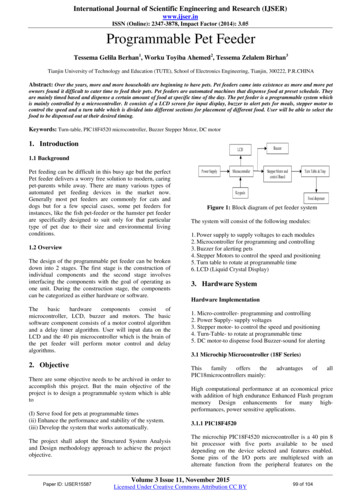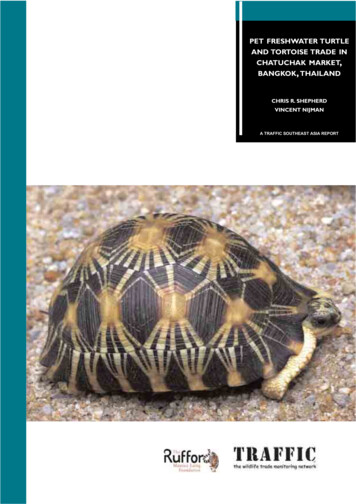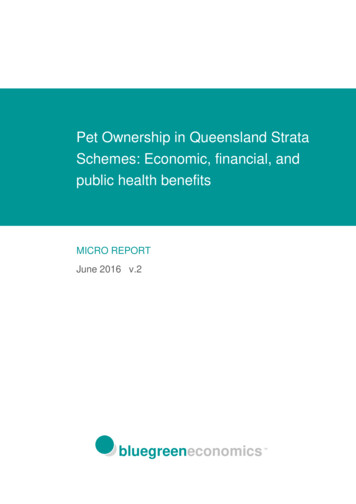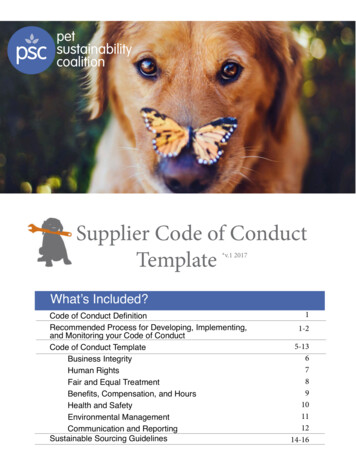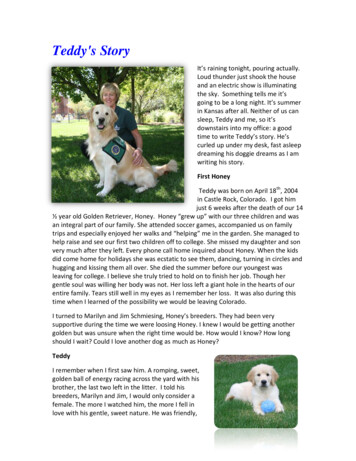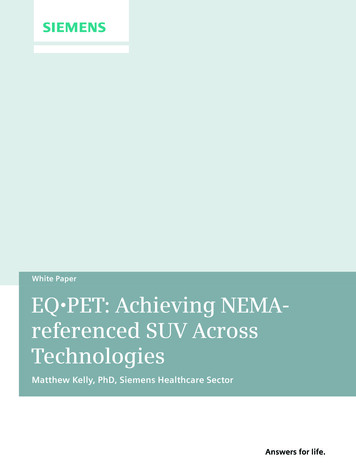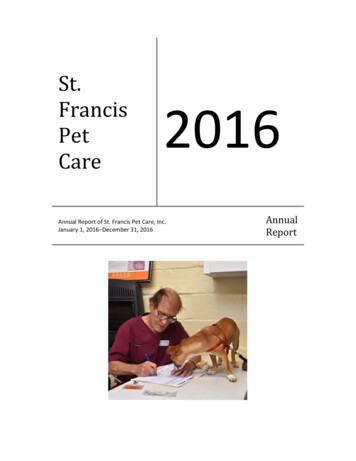
Transcription
St.FrancisPetCare2016Annual Report of St. Francis Pet Care, Inc.January 1, 2016–December 31, 2016AnnualReport
MissionThe charitable mission of St. Francis Pet Care (SFPC) is to help people in our mostvulnerable communities remain together with their pets so both can benefit from thehuman-animal bond. To this end, we provide primary veterinary care to the companionanimals of homeless persons, veterans referred from the VA, and very low incomeresidents of Alachua County, Florida. We work to reduce the number of companionanimals turned into shelters because their owners can no longer afford their care, and toincrease the proportion of spayed and neutered pets in the population we serve. Weeducate our clients in responsible pet care and help them improve the lives of their pets.We do outreach to the homeless campground to ensure the well-being of the animalsand reduce the incidence of zoonotic diseases. We also provide an educationalopportunity to students in the University of Florida’s College of Veterinary Medicine,who help at our weekly downtown clinic as part of their rotation in the VeterinaryCommunity Outreach Clerkship.ServicesSt. Francis Pet Care provides free primary non-emergency veterinary care and services toclients in our program at our weekly Clinic in downtown Gainesville and our monthlyoutreach Clinic at Grace Marketplace/Dignity Village.Primary veterinary servicesprovided include exams,consultations, treatment,vaccinations, microchips, and nail trimming. We providemedications when we have them instock, and write lowest costprescriptions when we don’t.Clients are requested to come inmonthly to pick up free doses offlea and heartworm preventives,and they can get free pet foodweekly. Pet supplies (leashes,collars, harnesses, coats, beds, cat litter, toys and treats) are offered when available.A major objective of SFPC is to teach responsible pet ownership and to encourage thespaying and/or neutering of all cats and dogs. Clients are allowed to have no more thantwo animals in the program at any one time, and in order to be accepted as clients, allanimals in their household must be spayed or neutered. SFPC arranges and pays for1
intact animals to be sterilized and in some cases provides transportation to and from thesurgery.We also reserve a relatively small amount of money to reimburse local animal hospitalsfor services when our patients require diagnostics or treatment that is beyond ourcapability to provide at Clinic. Since funds are not available for all animals who mightbenefit, decisions about special cases are made consultatively by clinic veterinarians.EligibilitySFPC only sees pets belonging to individuals who meet our eligibility criteria and haveattended a screening and orientation session. To be eligible for SFPC services, a personmust live in Alachua County, be homeless or have documented low income status, andmust own no unsterilized cats or dogs. With rare exceptions, we do not take collegestudents into the program. Only two pets per household are allowed into the program,and we strongly discourage clients from acquiring more than two animals. Clients mustnot breed or sell animals, or owe money to a local veterinary practice unless they arekeeping up with a payment plan.StaffSFPC is an all-volunteer organization. The weekly downtown clinic led by Dr. DaleKaplan-Stein is staffed by a fairly stable group of dedicated veterinarians, vet techs, andlay volunteers. Dr. Natalie Isaza brings five of her students from the College ofVeterinary medicine each week that school is in session. The monthly Outreach Clinic atGrace/DV is staffed by another group of volunteer vets and vet techs led by Dr. PattiGordon.The SFPC organization is governed by an active Board of Directors. Most short termplanning and procedural issues are decided at monthly meetings open to all SFPCvolunteers.While it is never difficult to keep the clinics themselves well-staffed, many key volunteerpositions remain unfilled, including Events Coordinator, Media Coordinator, andVolunteer Coordinator. Volunteer needs are listed on the United Way’s VolunteerSelectwebsite and SFPC regularly has a table at volunteer fairs held at the University of Floridaand Santa Fe College, as well as the Pre-Health Kickoff event at UF.2
Pet FoodEach week at our downtown Clinic we distribute roughly 400 pounds of dog food and 80pounds of cat food to our clients. In the spring of 2016 we received a grant from RedRover of 2000 for purchasing pet food, and as of the end of the year we had spent 1837 on food.Our two major sources of pet food are regular shipments of Purina ProPlan donated byNestlé Purina Petcare, and purchase of broken bag returns from the Bread of the MightyFood Bank at .18 per pound. These are supplemented by donations from the public.Notable donations in 2016 included 362 pounds of bagged dog and cat food fromTemple Shir Shalom as part of their Mitzvah Day activities, and a large food driveconducted by the UF Health Shands Human Relations Department during the holidayseason. In addition, local veterinary practices donate to us small but much appreciatedquantities of prescription and special diet food.Outreach ClinicSFPC began holding outreach clinics in late 2014 at the city/county homeless centercalled Grace Marketplace and the surrounding tent city called Dignity Village. In 2016,eleven monthly outreach clinics were held on Sunday afternoons. Pets of residents canreceive vaccinations, flea and heartworm preventives, and treatments for common skin,eye and ear conditions. Spay/neuter surgeries are arranged for intact animals.Residents can take their pets to the Tuesday downtown clinic if more involved pet care isrequired.Individuals whose pets are seen at the Outreach Clinic are treated like regular clients ofSFPC. Although they do not attend orientation, they complete the same paperwork andmust agree to the same set of rules as clients of the weekly downtown clinic. However,clients of the downtown clinic tend to remain in the program for years and come toclinic regularly for monthly medications. Clients of the Outreach Clinic are a moretransient population and attend fewer clinics. The Home Van Pet Care Project (HVPCP)has an active weekly presence at Grace Marketplace/Dignity Village, and HVPCPvolunteers provide vital information to the veterinarians of the Outreach Clinic,including which animals are newly arrived, which animals need spay/neuter, and whichowners would benefit from instruction in responsible pet ownership.Only service animals are allowed at Grace Marketplace, so most of the clients of theOutreach Clinic are tent campers at Dignity Village (DV). The rules that govern behaviorat DV include a section on pets which stipulates that all animals must be registered withthe DV manager, must be spayed or neutered, and must be up-to-date on vaccinations.These rules have been enforced to a greater or lesser degree as DV management3
changed three times during the calendar year. Without strict enforcement, dogs andpuppies tend to flow into DV and get passed from owner to owner, unneutered andunvaccinated. This puts the community at risk of an outbreak of communicable diseaseslike parvo. It takes the active involvement of SFPC, the Home Van Pet Care Project, DVmanagement, the Gainesville Police Department and Alachua County Animal Services tokeep the situation under control.New BuildingMuch effort went into planning for anew clinic building to be constructedon a lot that SFPC owns behind the St.Francis House homeless shelter andsoup kitchen. On May 12, 2016 anevent was held at the UF College ofVeterinary Medicine to kick off aCapital Campaign to fund construction.By the end of the year about a third ofthe amount needed had been raised.In November the Board of Directorsheld their first-ever day-long planning retreat to clarify visions for the new building andwhat it will mean for, and require of, the SFPC organization.The planned building will be approximately 2000 square feet, and is designed to allow usto expand our hours, our services, and our liaisonships with human health and socialservice organizations. When not in use by SFPC, building space will be usable by othergroups, as areas containing patient files and pharmaceuticals can be closed and locked.Notable Events During the YearThe year started on a sad note with the death of Dr. Paul Nicoletti (1932-2016), adistinguished veterinarian and epidemiologist and member of our Board of Directors.We miss his friendship and good advice. Several of our clients passed away during theyear, and we miss them all.In February a long-time client moved into her first apartment after years of living in atent. She had nothing. We put out a call on Facebook, and within a week the apartmentwas furnished with donations from dozens of our wonderful friends and supporters.4
In March we found a home for Lefty, a 12 year-old, 112 pound, one-eyed patient whoseowner was forced to surrender him because of a move. After a 3 month search and withhelp from a posting in Susie’s Senior Dogs, we placed him with the best family ever inTennessee.A kickoff event for the Capital Campaign for a new clinic building was held on May 12 atthe UF College of Veterinary Medicine. There was food and drink, music, and of coursespeeches!In June SFPC was featured on The Ilene Silverman Show. Several of our volunteers got totalk about what they do at SFPC and what it means to them to be part of thisorganization. Also in June, our favorite grade-schooler, for the second year in a row,asked his family and friends to donate to SFPC instead of giving him birthday presents.What an extraordinary young man!One day in August aclient brought in amamma dog and fourpups. We don’tnormally take puppiesinto the program, butwe got them vetted,cleaned up, andultimately adopted togood homes. Mammadog got spayed and isdoing fine.For the second year in a row, the local-band-made-good Less Than Jake held a “Wakeand Bake” music festival over the Memorial Day weekend and promoted St. Francis PetCare throughout. (The “Jake” in the band’s name refers to the drummer’s dog, and themusicians are all pet lovers.) They encouraged fans to donate money, pet food and petsupplies.In September, SFPC co-founder and clinic vet Natalie Isaza won the American HumaneAssociation’s Hero Veterinarian Award for her work at SFPC and with the VeterinaryCommunity Outreach Program at the UF College of Veterinary Medicine. The awardceremony in Los Angeles was televised and rebroadcast on the Hallmark Channel inOctober. We always knew Dr. Natalie was a hero, but now the rest of the world doestoo!In October we tabled at the annual Pride Festival and the Wild Adventures Open Houseat the Carson Springs Wildlife Conservation Foundation Preserve. That was hard5
because both events were the same day, but our volunteers had a great time. InNovember we tabled at the Downtown Festival and Art Show. We raffled a basket ofcoffee and chocolate and made enough in donations to purchase a small-animal scale.Simply Done Tech Solutions, a Miami-based company, agreed to re-do our website on amodern platform (WordPress) pro bono. They began working with our volunteers inthe summer with a target completion date in December 2016. The site actually wentlive in January 2017 and it is gorgeous. We can’t wait to tell you about it in the 2017annual report!The Last Clinic of the YearIn every annual report we try to include a few paragraphs that can give readers a morecomplete picture of the SFPC organization. This year we thought we’d focus on a singleclinic, the last clinic of 2016. The names of clients and patients have been changed toprotect their privacy, but the narrative is true.The last clinic of 2016 was held the Tuesday between Christmas and the New Year, and itwas one of the slowest clinics of the year. The previous week we had held our holidayparty and that was extra busy. We’d set out tables in the courtyard with snacks andcold drinks and boxes of fruit, and clients socialized while they waited to be seen. Webrought 100 stockings filled with toiletries and other goodies and passed them out, oneper client, until we ran out a little before noon. Thanks to a huge donation from the UFHealth Human Resources Department the week before, we also had treats for all ourfour-legged patients.But the last clinic of 2016 was slow. Only eleven people came to see a veterinarian,which was good because we had only two veterinarians present. We were short ofother staff as well, and they stayed busy.One of our volunteers was able to spend the morning on the phone trying to locate BH,one of our homeless clients. BH had a lovely lab mix named Angie who had been stolenabout a month before. He was heartbroken, and his mental and physical healthdeteriorated noticeably. The Friday before Christmas we were notified by the MarionCounty Animal Shelter that they were holding Angie; her microchip traced to both BHand St. Francis Pet Care. Unfortunately the shelter was closed Saturday throughMonday for Christmas, so Tuesday was our first chance to get back to them. Theycouldn’t release Angie to anyone but BH until a 10 day waiting period expired later in theweek. Even more unfortunately, we couldn’t locate BH – he wasn’t answering hisphone or staying at his usual campsite. So our volunteer spent the morning makingcalls, checking jails, hospitals and crisis units in Alachua and Marion Counties, andgenerally putting out the word for BH to get in touch.6
At the same time, another volunteer was helping JD, a member of our program who wastrying to get his own dog back. Years before, the original owner had surrendered Hattieto a second party who in turn surrendered her to JD. Suddenly the original owner tookthe dog and wouldn’t give her up. We had all the paperwork in our files, and knew thatJD was the current legitimate owner and that he took good care of Hattie. JD asked theGainesville Police Department to he
help from a posting in Susie’s Senior Dogs, we placed him with the best family ever in Tennessee. A kickoff event for the Capital Campaign for a new clinic building was held on May 12 at the UF College of Veterinary Medicine. There was food and drink, music, and of course spee
